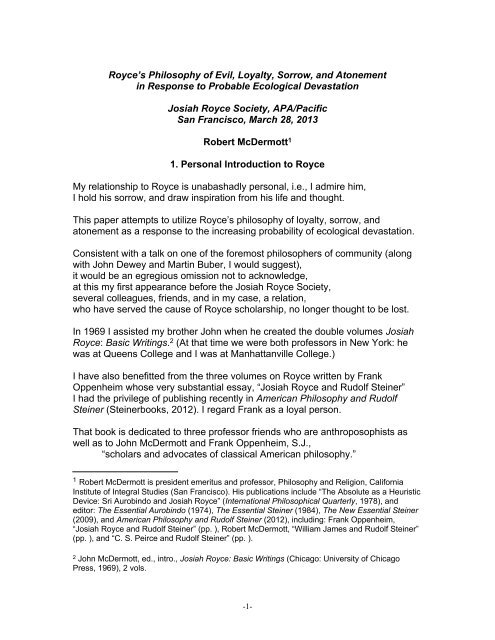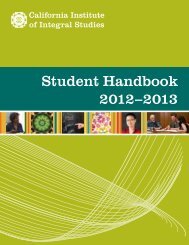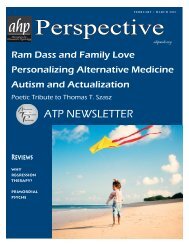Royce's Philosophy of Evil, Loyalty, Sorrow, and Atonement in ...
Royce's Philosophy of Evil, Loyalty, Sorrow, and Atonement in ...
Royce's Philosophy of Evil, Loyalty, Sorrow, and Atonement in ...
You also want an ePaper? Increase the reach of your titles
YUMPU automatically turns print PDFs into web optimized ePapers that Google loves.
Royce’s <strong>Philosophy</strong> <strong>of</strong> <strong>Evil</strong>, <strong>Loyalty</strong>, <strong>Sorrow</strong>, <strong>and</strong> <strong>Atonement</strong><strong>in</strong> Response to Probable Ecological DevastationJosiah Royce Society, APA/PacificSan Francisco, March 28, 2013Robert McDermott 11. Personal Introduction to RoyceMy relationship to Royce is unabashadly personal, i.e., I admire him,I hold his sorrow, <strong>and</strong> draw <strong>in</strong>spiration from his life <strong>and</strong> thought.This paper attempts to utilize Royce’s philosophy <strong>of</strong> loyalty, sorrow, <strong>and</strong>atonement as a response to the <strong>in</strong>creas<strong>in</strong>g probability <strong>of</strong> ecological devastation.Consistent with a talk on one <strong>of</strong> the foremost philosophers <strong>of</strong> community (alongwith John Dewey <strong>and</strong> Mart<strong>in</strong> Buber, I would suggest),it would be an egregious omission not to acknowledge,at this my first appearance before the Josiah Royce Society,several colleagues, friends, <strong>and</strong> <strong>in</strong> my case, a relation,who have served the cause <strong>of</strong> Royce scholarship, no longer thought to be lost.In 1969 I assisted my brother John when he created the double volumes JosiahRoyce: Basic Writ<strong>in</strong>gs. 2 (At that time we were both pr<strong>of</strong>essors <strong>in</strong> New York: hewas at Queens College <strong>and</strong> I was at Manhattanville College.)I have also benefitted from the three volumes on Royce written by FrankOppenheim whose very substantial essay, “Josiah Royce <strong>and</strong> Rudolf Ste<strong>in</strong>er”I had the privilege <strong>of</strong> publish<strong>in</strong>g recently <strong>in</strong> American <strong>Philosophy</strong> <strong>and</strong> RudolfSte<strong>in</strong>er (Ste<strong>in</strong>erbooks, 2012). I regard Frank as a loyal person.That book is dedicated to three pr<strong>of</strong>essor friends who are anthroposophists aswell as to John McDermott <strong>and</strong> Frank Oppenheim, S.J.,“scholars <strong>and</strong> advocates <strong>of</strong> classical American philosophy.”1 Robert McDermott is president emeritus <strong>and</strong> pr<strong>of</strong>essor, <strong>Philosophy</strong> <strong>and</strong> Religion, CaliforniaInstitute <strong>of</strong> Integral Studies (San Francisco). His publications <strong>in</strong>clude “The Absolute as a HeuristicDevice: Sri Aurob<strong>in</strong>do <strong>and</strong> Josiah Royce” (International Philosophical Quarterly, 1978), <strong>and</strong>editor: The Essential Aurob<strong>in</strong>do (1974), The Essential Ste<strong>in</strong>er (1984), The New Essential Ste<strong>in</strong>er(2009), <strong>and</strong> American <strong>Philosophy</strong> <strong>and</strong> Rudolf Ste<strong>in</strong>er (2012), <strong>in</strong>clud<strong>in</strong>g: Frank Oppenheim,“Josiah Royce <strong>and</strong> Rudolf Ste<strong>in</strong>er” (pp. ), Robert McDermott, “William James <strong>and</strong> Rudolf Ste<strong>in</strong>er”(pp. ), <strong>and</strong> “C. S. Peirce <strong>and</strong> Rudolf Ste<strong>in</strong>er” (pp. ).2John McDermott, ed., <strong>in</strong>tro., Josiah Royce: Basic Writ<strong>in</strong>gs (Chicago: University <strong>of</strong> ChicagoPress, 1969), 2 vols.-1-
As is evident <strong>in</strong> this paper, my Royce is Frank Oppenheim’s Royce,that is to say, I share Frank’s commitment to Royce’s philosophic perspectives,<strong>and</strong> perhaps more reveal<strong>in</strong>gly, his appreciation <strong>of</strong> Royce’s personal virtue<strong>and</strong> his religious, <strong>and</strong> specifically Christian sensibility.I am also grateful to Michael Brodrick who generously guided me <strong>and</strong> this talkfrom my first idea <strong>of</strong> it—“Royce <strong>and</strong> C. G. Jung on The Book <strong>of</strong> Job”—to this presentation.Although I published an essay entitled“The Absolute as a Heuristic Device: Josiah Royce <strong>and</strong> Sri Aurob<strong>in</strong>do”<strong>in</strong> International Philosophical Quarterly <strong>in</strong> 1978I consider myself to be at the entry level <strong>of</strong> Royce scholarship.I would like to th<strong>in</strong>k, however, that the task <strong>of</strong> prepar<strong>in</strong>g this talk,<strong>and</strong> the pleasure it has brought <strong>in</strong> anticipation <strong>of</strong> its deliveryon this occasion before members <strong>of</strong> the Josiah Royce Society,might signal my emergence as a serious student <strong>of</strong> Josiah Royce.As we all cont<strong>in</strong>ue to experience ecological crises I will cont<strong>in</strong>ue to look to Roycefor <strong>in</strong>sight <strong>and</strong> <strong>in</strong>spiration.II. Ecological Catastrophy <strong>and</strong> Impend<strong>in</strong>g <strong>Sorrow</strong>I come to ecology as a cause forced on all th<strong>in</strong>k<strong>in</strong>g, responsible personsat this time <strong>of</strong> unprecedented, <strong>and</strong> perhaps irremediable deterioration.My sources <strong>in</strong> the past ten years have <strong>in</strong>cluded such core ecological writ<strong>in</strong>gs asThomas Berry, Dream <strong>of</strong> the Earth (1988)Mary Evelyn Tucker <strong>and</strong> John Grim’s ten volumes on religion <strong>and</strong> ecology,Bill McKibben, The End <strong>of</strong> Nature (1990),Al Gore’s Inconvenient Truth (2006)Elizabeth Kolbert, Field Notes from a Catastrophe (2006),Paul Hawken, Blessed Unrest (2007)the analyses <strong>of</strong> the Intergovernmental Panel on Climate Change (IPCC),<strong>and</strong> the publications <strong>of</strong> World Watch <strong>and</strong> Earth Policy Institute.I take the <strong>in</strong>formation <strong>and</strong> analyses <strong>in</strong> these <strong>and</strong> other worksto be factual <strong>and</strong> their predictions to be as accurate as they are horrify<strong>in</strong>g.Neither should we doubt that this deterioration is caused by a comb<strong>in</strong>ation <strong>of</strong>selfishness <strong>and</strong> faulty world views <strong>of</strong> <strong>in</strong>dividuals <strong>and</strong> groups who have createdthis situation <strong>and</strong> would be <strong>in</strong> a position to effect the necessary changes.-2-
IV. Royce, a Loyal <strong>and</strong> Virtuous Virtue EthicistThroughout his entire career, <strong>and</strong> particularly beg<strong>in</strong>n<strong>in</strong>g <strong>in</strong> 1908 with thepublication <strong>of</strong> <strong>Philosophy</strong> <strong>of</strong> <strong>Loyalty</strong> through his last major work, The Problem<strong>of</strong> Christianity, Royce considered every ideal to have an <strong>in</strong>dividual as well as acommunal context <strong>and</strong> mean<strong>in</strong>g.He saw every thought <strong>and</strong> decision surrounded by concentric circles <strong>of</strong>significance <strong>and</strong> <strong>in</strong>fluence.The ever evolv<strong>in</strong>g yet ever unified community <strong>of</strong> ideals<strong>in</strong>cludes the efforts <strong>of</strong> <strong>in</strong>dividuals to serve their uniquely worthy causes,<strong>in</strong>clud<strong>in</strong>g, <strong>and</strong> perhaps especially, causes that seem lost.Royce urges each <strong>in</strong>dividual to th<strong>in</strong>k <strong>and</strong> act <strong>in</strong> harmony with the community <strong>of</strong>ideals, the Beloved Community.For Royce, a community is beloved to the extentthat it is comprised <strong>of</strong> free, lov<strong>in</strong>g, <strong>in</strong>dividualscommitted to the good <strong>of</strong> the whole,<strong>in</strong>clud<strong>in</strong>g a will<strong>in</strong>gness to carry faithfully, or loyally,the pa<strong>in</strong> <strong>and</strong> suffer<strong>in</strong>g <strong>of</strong> <strong>in</strong>dividuals <strong>in</strong> the entire community.Virtue ethics, which has developed steadily s<strong>in</strong>ce mid-20 th century,is <strong>in</strong>tended to shift the focus <strong>of</strong> ethics away from both deontological (or rulebased)ethics <strong>and</strong> consequentialist (or utilitarian) ethics, though I th<strong>in</strong>k that theway I am <strong>in</strong>terpret<strong>in</strong>g Royce as a virtue ethicist is not necessarily, or strictly,opposed to either Kant or Mill:— with Kant Royce sees the need to universalize one’s motive whenmak<strong>in</strong>g a moral decision, <strong>and</strong> try<strong>in</strong>g to be a moral, virtuous person;— with Mill Royce sees the need to keep one’s eye on the need <strong>of</strong> thecommunity, not strictly the greatest good for the greatest number but surely <strong>in</strong> aneffort to serve that number loyally.Because it focuses on the development <strong>of</strong> the moral character<strong>of</strong> the agent <strong>and</strong> the community <strong>of</strong> free <strong>in</strong>dividuals,virtue ethics would seem especially helpful <strong>in</strong> the present,<strong>and</strong> no doubt cont<strong>in</strong>u<strong>in</strong>g, challenge.Admittedly, we are <strong>in</strong> a circle, <strong>and</strong> perhaps an impasse,the very one that Aristotle admitted <strong>in</strong> the Nichomachean Ethics:When asked for criteria for the virtue <strong>of</strong> a particular action,Aristotle replied, “the reason <strong>of</strong> the prudent man,”-4-
the “man <strong>of</strong> right reason. 4 He recognized that it takes a person who has becomepracticed <strong>in</strong> wisdom <strong>and</strong> goodness to make right decisions.I admit the circle <strong>and</strong> forthrightly <strong>of</strong>fer Royce as a virtuous personwhose eye for virtue is to be trusted.This is still a circle but it is one <strong>in</strong> which the person counts decisively.It is the <strong>in</strong>dividual person who,by many discipl<strong>in</strong>es <strong>and</strong> reveal<strong>in</strong>g experiences,must develop a virtuous, i.e., a loyal character.V. Royce’s Sources <strong>of</strong> Religious Insight, 1911In his Sources <strong>of</strong> Religious Insight, 5Royce urges each <strong>in</strong>dividual to hold <strong>in</strong> tension the completely <strong>in</strong>dividual <strong>and</strong> thelargest <strong>in</strong>telligible purposes.Sources <strong>of</strong> Religious Insight <strong>in</strong>cludes seven sources, each <strong>of</strong> which is availablefor an aid to the battle with evil, suffer<strong>in</strong>g, <strong>and</strong> sorrow, all components <strong>of</strong> theevolv<strong>in</strong>g ecological situation.Here, briefly, are the seven sources with an eye to the present situation:1. Individual devotionRoyce the champion <strong>of</strong> the community,never loses sight <strong>of</strong> the free, participat<strong>in</strong>g,loyal <strong>in</strong>dividual as a source <strong>of</strong> community.The great need <strong>of</strong> the present is for devotion <strong>of</strong> each <strong>in</strong>dividualto the task <strong>of</strong> sav<strong>in</strong>g the Earth.2. Society or community: In the case <strong>of</strong> ecological devastation,the focus must be on the community <strong>of</strong> all sentient be<strong>in</strong>gs.committed to the good <strong>of</strong> the whole.Each ideal participates <strong>in</strong> larger ideals,<strong>in</strong> the personal character <strong>of</strong> the ultimate ideal reality,the Logos-spirit, the source <strong>and</strong> goal <strong>of</strong> the Beloved Community.3. Reason: knowledge(s).Royce exemplified careful th<strong>in</strong>k<strong>in</strong>g, exactly the k<strong>in</strong>d that is needed <strong>in</strong> thepresent ecological situation.4Don Hanlon Johnson, Body, Spirit, <strong>and</strong> Democracy (Berkeley, CA: North Atlantic Books, 1994),p. 62.5Josiah Royce, Sources <strong>of</strong> Religious Insight (-5-
4. Will, striv<strong>in</strong>g toward virtue. It takes great will to face the reality <strong>of</strong> a planetapparently head<strong>in</strong>g toward destruction.5. <strong>Loyalty</strong> to loyalty:Royce sees loyalty to loyalty as the core value, the s<strong>in</strong>e qua non <strong>of</strong> virtue.The present need is for loyalty to Earth,to the only planet known to susta<strong>in</strong> life.6. <strong>Sorrow</strong> a necessary step on the way to love.Surely the contemplation <strong>of</strong> all that has been lost,<strong>and</strong> all that is likely to be lost <strong>in</strong> com<strong>in</strong>g decades,can only <strong>in</strong>stensify the love with which must respond to its Earthly body.7. <strong>Atonement</strong>, is the highest virtue <strong>in</strong> Royce’s ethics <strong>and</strong> religious thought.<strong>Atonement</strong> will have to become a widely shared experience.These seven sources issue from <strong>and</strong> are characterized bya Christian (specifically Paul<strong>in</strong>e) conception <strong>of</strong> love,a metaphysics which is idealist but no longer particularly Hegelian,a Peircean realist epistemology <strong>and</strong> logic,<strong>and</strong> a dist<strong>in</strong>ctive version <strong>of</strong> virtue ethics, though not identified as such,significantly <strong>in</strong> both theory <strong>and</strong> practice.VI. Royce’s Problem <strong>of</strong> ChristianityOn September 13, 1910, on disembark<strong>in</strong>g from a voyage from DutchGuiana, Royce was <strong>in</strong>formed <strong>of</strong> the death <strong>of</strong> William James, his mentor <strong>and</strong>friend.Royce found himself unable to describe this loss or to compose an obituary.Eight days later, Royce’s son Christopher died <strong>of</strong> typhoid fever.Royce entered what he later called “the hell <strong>of</strong> the irrevocable.” 6He was acqua<strong>in</strong>ted with grief.This double, unbearable loss, def<strong>in</strong>itely challenged Royce’s conviction that Godenters <strong>in</strong>to evil <strong>and</strong> suffer<strong>in</strong>g as a way <strong>of</strong> lift<strong>in</strong>g themto love <strong>and</strong> to a greater complexity <strong>in</strong> unity.In 1912, after suffer<strong>in</strong>g a stroke, Royce read Christian theologians <strong>and</strong>scrut<strong>in</strong>ized Peirce’s theory <strong>of</strong> signs <strong>and</strong> method <strong>of</strong> <strong>in</strong>terpretation.Oppenheim: “Thus prepared, Royce employs a new philosophical medium,method, <strong>and</strong> message with depth <strong>and</strong> ease when draft<strong>in</strong>g his lectures onChristianity.” (RRL, xviii)6John Clendenn<strong>in</strong>g, The Life <strong>and</strong> Thought <strong>and</strong> Josiah Royce (Madison, WI: The University <strong>of</strong>Wiscons<strong>in</strong> Press, 1985).-6-
In The Problem <strong>of</strong> Christianity, Royce’s magnum opus, which was published onehundred years ago,he “recommended idealiz<strong>in</strong>g life’s suffer<strong>in</strong>g <strong>in</strong>to sorrows so that one can discernlife’s higher realms.When so enlightened, one may identify with those who are will<strong>in</strong>g to suffervicariously, to give their lives as a ransom for many s<strong>in</strong>ce these tell us whatatonement means.” (PC, 182-84)As Frank Oppenheim has shown, <strong>in</strong> the last several years <strong>of</strong> his tragic life,1914-16, Royce atta<strong>in</strong>ed a greater depth <strong>of</strong> philosophical perspective <strong>and</strong> affect.“Royce came to see with<strong>in</strong> aton<strong>in</strong>g deeds that reconcil<strong>in</strong>g function which amediat<strong>in</strong>g <strong>in</strong>terpreter creates….Oppenheim cont<strong>in</strong>ues:A mediator “meets evil by creat<strong>in</strong>g <strong>and</strong> <strong>in</strong>sert<strong>in</strong>g a mediat<strong>in</strong>g third idea even whileplac<strong>in</strong>g one’s trust <strong>in</strong> the far wider <strong>and</strong> deeper wisdom <strong>of</strong> the Interpreter Spirit <strong>of</strong>the Universal Community.”VII. <strong>Atonement</strong> <strong>in</strong> Response to Ecological DevastationAll <strong>of</strong> Royce’s thought aspires to,<strong>and</strong> I believe achieves,the depth <strong>and</strong> universality necessary to mitigatethe bewilderment <strong>and</strong> sorrow which will almost certa<strong>in</strong>lybe visited upon humanity<strong>and</strong> all earthly species <strong>in</strong> com<strong>in</strong>g decades.Royce’s conception <strong>and</strong> practice <strong>of</strong> loyalty reaches to the cosmos:“I can be genu<strong>in</strong>ely <strong>in</strong> love with the community only <strong>in</strong> caseI have somehow fallen <strong>in</strong> love with the universe." 7Royce’s commitment to the path <strong>of</strong> loyalty <strong>and</strong> sorrow,<strong>and</strong> more remarkably, the ideal <strong>of</strong> atonement,did not lead him to simplify the task<strong>of</strong> respond<strong>in</strong>g to life’s conflict<strong>in</strong>g responsibilities:each <strong>in</strong>dividual, <strong>in</strong>extricably <strong>in</strong> the context <strong>of</strong> complex,compet<strong>in</strong>g communities,is called up by the distant <strong>and</strong> uncerta<strong>in</strong> goal <strong>of</strong> ideal unity.In the present, <strong>and</strong> no doubt cont<strong>in</strong>u<strong>in</strong>g,challenge <strong>of</strong> ecological devastation,the whole <strong>of</strong> humanity faces an <strong>in</strong>evitable cause <strong>of</strong> horrific sorrow.7Josiah Royce, The Problem <strong>of</strong> Christianity (Chicago: University <strong>of</strong> Chicago Press,1968), p. 269-7-
As a wise <strong>and</strong> virtuous person Royce would surely see <strong>and</strong> faceecological devastation.As a loyal person he would immediately <strong>and</strong> heroically react to the needs <strong>of</strong>Earth. He would be compelled to do so because he had so developed loyalty touniversal loyalty as the def<strong>in</strong><strong>in</strong>g quality <strong>of</strong> his character. 8Royce ma<strong>in</strong>ta<strong>in</strong>s that every act <strong>of</strong> disloyalty,no matter how deep, must be asserted as“the basis <strong>of</strong> all the best <strong>and</strong> most practical spirituality.” 9 [Kelly Parker]As the perfect storm <strong>of</strong> radical weather <strong>and</strong> species ext<strong>in</strong>ction,exacerbated by human fear <strong>and</strong> greed,will <strong>in</strong>creas<strong>in</strong>gly cause an extent <strong>and</strong> depth <strong>of</strong> sorrowthe entire human community,<strong>and</strong>, I believe all liv<strong>in</strong>g species,will need philosophical <strong>and</strong> spiritual as well as practical wisdom.Royce provides all three.We know from Royce’s courses <strong>in</strong> ethics,particularly his course at Boston University <strong>in</strong> 1915,that he was try<strong>in</strong>g to jo<strong>in</strong> his spiritual vision with actual ethical conflicts.He sought to teach wisdom <strong>and</strong> virtue concern<strong>in</strong>g actual cases–Specifically, on an exam he asked his students to respond to the case <strong>of</strong> thedaughter <strong>in</strong> a conflict with her mother’s steal<strong>in</strong>g,<strong>and</strong> the doctor who moves from his home town as a moral decision<strong>in</strong> response to a medical crisis,If he were teach<strong>in</strong>g today I picture Royce tell<strong>in</strong>g his ethics class that ourmistreatment <strong>of</strong> the Earth will cause damage now <strong>and</strong> will endure as s<strong>in</strong> that can<strong>and</strong> must be lifted by a devotion to Earth <strong>and</strong> the Beloved Community.In the spirit <strong>of</strong> cases <strong>of</strong> conflict that need a mediat<strong>in</strong>g third, <strong>and</strong> need a loyaldeed to lift them to resolution or atonement, let me br<strong>in</strong>g to this community <strong>of</strong>Royce scholars a case <strong>of</strong> a “lost cause” loyally served that I th<strong>in</strong>k Royce wouldappreciate.In the mid-1950s Marjorie Spock, argued aga<strong>in</strong>st the right <strong>of</strong> New York State tospray her Long Isl<strong>and</strong> farm with DDT.8For Royce’s ethics see several volumes by Frank M. Oppenheim, S.J., especially Royce’sMature Ethics (Notre Dame, IN: University <strong>of</strong> Notre Dame Press, 1993).9Kelly A. Parker, <strong>in</strong> Kelly A. Parker <strong>and</strong> Krizyszt<strong>of</strong> Piotr Skowronski, eds., “<strong>Atonement</strong> <strong>and</strong>Eidetic Ext<strong>in</strong>ction,” <strong>in</strong> Josiah Royce for the Twenty-First Century (Lanham, MD: Rowman <strong>and</strong>Littlefield/Lex<strong>in</strong>gton, 2012., p. 216.-8-
In Connecticut, Rachel Carson, unable to f<strong>in</strong>d anyone to write an expose<strong>of</strong> the pollution <strong>of</strong> the Connecticut River, was told <strong>of</strong> the case that Marjorie Spockwas va<strong>in</strong>ly argu<strong>in</strong>g aga<strong>in</strong>st New York State—clearly a lost cause.Based on weeks <strong>in</strong> attendance <strong>in</strong> the Garden City, Long Isl<strong>and</strong> court,Rachel Carson wrote a series <strong>of</strong> essays for the New Yorker.She exp<strong>and</strong>ed that essay <strong>in</strong>to a full-length book, Silent Spr<strong>in</strong>g,which is widely credited with launch<strong>in</strong>g the ecological movement.Their deed was saved by the same div<strong>in</strong>e realitythat promises love <strong>and</strong> redemption to all s<strong>in</strong>ners as well as to all sa<strong>in</strong>ts,to all endeavors both efficacious <strong>and</strong> seem<strong>in</strong>gly <strong>in</strong> va<strong>in</strong>.Royce’s Job did not suffer <strong>in</strong> va<strong>in</strong>. As the text says,unlike his three friends, Job saw God face to face.As Royce says, suffer<strong>in</strong>g, such as the suffer<strong>in</strong>g <strong>of</strong> Job,is redemptive <strong>in</strong> the big picture, on the long run, <strong>in</strong> the end.When the righteous, the pro-Earth workers, experience suffer<strong>in</strong>g such as Job’s,they will know that their redeemer liveth.Oppenheim:He gradually delved more <strong>in</strong>timately <strong>and</strong> penetrat<strong>in</strong>gly <strong>in</strong>to the problemuntil he adopted the humble trust<strong>in</strong>g stance <strong>of</strong> a pilgrim trust<strong>in</strong>g his wayamid a good world scarred with evils. This pilgrim would by creative toilmake progress thanks to the ever-present <strong>and</strong> trustworthy Interpreter, theLogos-Spirit, who keeps guid<strong>in</strong>g him.“Such was Royce’s most mature philosophical response to the problem <strong>of</strong> evil.He had reflected on it longer <strong>and</strong> written about it more than Peirce, James, <strong>and</strong>Dewey had done, taken all together.” (418, from RRL, xii-xiii; LW, 2:77-83We can detect a voluntarist, a will element, <strong>and</strong> a modesty <strong>in</strong> Royce’s conviction.It was Royce who gave James the idea for James’ famous “Will to Believe” (forwhich James thanked Royce with typical Jamesian generosity).The present ecological situation is urgent, we must respond, <strong>and</strong> withreference to the ultimate mean<strong>in</strong>g <strong>of</strong> this process, we will cont<strong>in</strong>ue to have lessunderst<strong>and</strong><strong>in</strong>g than would be necessary for a confident decision.Similarly, I am unsure <strong>of</strong> my proposal that Royce’s concepts <strong>of</strong> sorrow, loyalty,<strong>and</strong> atonement might be a way to lift, <strong>and</strong> perhaps transform, the currentopposition between exploiters <strong>and</strong> susta<strong>in</strong>ers <strong>of</strong> Earth.-9-
At the least we might want to try on Royce’s microcosmic-macrocosmic polarityas a paradigm richer than many dom<strong>in</strong>ant approaches <strong>and</strong> perspectives.As we do need a transformation <strong>and</strong> an ideal vessel for our current <strong>and</strong>forthcom<strong>in</strong>g efforts, I th<strong>in</strong>k we do well to m<strong>in</strong>e the deep <strong>in</strong>sights <strong>of</strong> thephilosopher from Grass Valley, to whom I give the last words <strong>in</strong> this talk:Pr<strong>of</strong>essor Royce’s f<strong>in</strong>al words <strong>in</strong> response to the problem <strong>of</strong> evil,<strong>and</strong> <strong>of</strong>fer them as a fitt<strong>in</strong>g response to the contemporary ecological situation.The dutiful spirit leaves to what it calls God the art <strong>of</strong> mak<strong>in</strong>g the greattriumph, <strong>of</strong> solv<strong>in</strong>g everyman’s problem […], <strong>and</strong> <strong>of</strong> reconcil<strong>in</strong>g the poor<strong>in</strong>dividual man whose head fortune so <strong>of</strong>ten leaves bleed<strong>in</strong>g, to the blows<strong>of</strong> chance which he is sometimes too weak merely to defy.Now just this strange union <strong>of</strong> patient acquiescence with resoluteself-expression, this harmoniz<strong>in</strong>g <strong>of</strong> a certa<strong>in</strong> piety towards what thedutiful soul regards as div<strong>in</strong>e with a k<strong>in</strong>d <strong>of</strong> shar<strong>in</strong>g <strong>of</strong> … vigorous self-will,—this unearthly confidence that, beyond all sorrow, all shall be, for thedutiful, somehow good, despite the fact that the dutiful soul does notalways feel sure about what the true solution <strong>of</strong> Everyman’s problem is, allthis…constitutes one very serious ground why our time has so <strong>of</strong>ten lostits power to underst<strong>and</strong> what duty, apart from the actual w<strong>in</strong>n<strong>in</strong>g <strong>of</strong> goodfortune, really means, <strong>and</strong> how one can be high-spirited, although dutiful.(FO, RRL, 418)-10-





